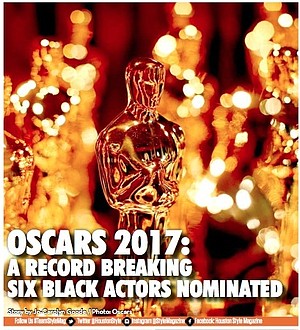1/27/2017

After much backlash, it seems the Oscars have finally got a touch of melanin. This year’s Oscars list has a record breaking six African Americans nominees in dominant categories. Plus, three movies are up for Best Picture. The Oscars have gone from #OscarsSoWhite to #OscarsSoBlack.
It was Hattie McDaniel who first paved the way for African Americans in Hollywood history. McDaniel was both the first African American to be nominated and win. She won Best Supporting Actress for her role in Gone With the Wind in 1940. The next major milestone would not occur until 28 years later when two African Americans became nominated in the same category, although it was not known at the time. Beah Richards of “Guess Who’s Coming to Dinner” was up against Carol Channing of “Thoroughly Modern Millie” for Best Supporting Actress. Channing did not reveal her African American lineage until years later. And who can forget the historic wins of Hallie Berry (“Monster’s Ball”) and Denzel Washington (“Training Day”) in the Best Actress and Best Actor categories in 2001.
But never has there ever been an Oscar list of nominees with such diversity. The most crowded field is that of Best Actress with Viola Davis for “Fences,” Octavia Spencer for “Hidden Figures,” and Naomie Harris for “Moonlight” in the same category. Also snagging nominations are Ruth Negga for Best Actress in a Leading Role for “Loving,” Denzel Washington for Best Actor in a Leading Role for “Fences,” Mahershala Ali for Best Actor in a Supporting Role for “Moonlight,” and Barry Jenkins for Best Director for “Moonlight.”
“Moonlight” leads the pack for African-American films with the most nominations as it is also in competition for Best Picture with “Fences” and “Hidden Figures.” Additionally, three other films are up for Best Documentary – “13th,” “OJ: Made in America,” and “I am Not Your Negro.”
What sparked this increase of blackness to the Oscars? A shake up in who was voting. According to the New York Times, the academy has been making changes to its white male dominated membership to include more women and minorities. That coupled with an increase of high-quality films starring minorities has made this year’s the blackest Oscars ever.
Though many of the actors and actresses nominated are thankful for the recognition of their work, they look forward to the day when the color of your skin won’t matter, just your talent. “I think it’s unfortunate that we still have to focus on color. What the Oscars are about and what the awards should be about is a recognition of talent and incredible hard work, irrespective of color,” said Naomie Harris, Best Supporting Actress nominee. Davis, who is the first African American to have three Oscar nominations in her career, said, "Thank you to the Academy for recognizing this extraordinary, important film and my work in it. Thank you, Denzel, for being at the helm!"
All this buzz for African American actors and actresses is good news but other minorities are still feeling the cold shoulder. Hispanics are almost absent from this year’s Oscars if weren’t for the nomination of Lin-Manuel Miranda for Best Original Song “How Far I’ll Go.”
In the history of the Oscars only one Latino has ever walked away with the golden statue for Best Actor. That was Jose Ferrer who won in 1950. A Latina would not be nominated for Best Actress until 1998. Only a handful of other Latino actors and actresses have won Oscars including Anthony Quinn for Best Supporting Actor in 1952 and 1956; Rita Moreno for Best Supporting Actress in 1962; and Mercedes Ruehl for Best Supporting Actress in 1992. Mexican director Alfonso Cuarón was the first Latino Mexican cinematographer to win an Oscar while Emmanuel Lubezki is the record breaker with seven nominations and one win.
Looking at this history, it is evident that Hollywood has come a long way and still has further to go. Actors must continue to raise their collective voices to call out wrongs, demand better opportunities, and create their own way in tinsel town. The more exposure, the more diversity, the more the Oscars will look like all of America.
